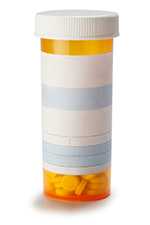Key Findings: How much do we know about the most common medicines used during pregnancy?
Remember
Pregnant women should not stop or start taking any type of medicine that they need without first talking with a health care provider. Women who are planning to become pregnant should discuss the need for any medicine with their health care provider before becoming pregnant and ensure they are taking only medicines that are necessary.
In a new CDC study, researchers identified the medicines most commonly used by women during the first trimester (first three months) of pregnancy. They also looked at the gaps in information about the safety or risk of using these medicines during pregnancy. These gaps in knowledge limit the ability for women and their health care providers to make informed decisions about the use of medication during pregnancy. You can read the article’s abstract here. Read more below for a summary of the findings from this article.
Main Findings from this Study
Most Commonly Used Medicines in the First Trimester of Pregnancy
Prescription Medicines

Birth control pills
A medicine to prevent pregnancy
Amoxicillin
A medicine to treat infections
Progesterone
A hormone to treat many conditions
Albuterol
A medicine to help control asthma
Promethazine
A medicine to help with allergies or nausea
Over-the-Counter Medicines

Acetaminophen
A medicine to help with pain – Brand name: Tylenol®
Ibuprofen
A medicine to help with pain – Brand name: Advil®, Motrin®
Docusate
A medicine to soften stool
Pseudoephedrine
A medicine to treat cold symptoms
Aspirin
A medicine used to treat many conditions including pain
Naproxen
A medicine to help with pain – Brand name: Aleve®
- Women commonly use medicine during early pregnancy, and in this study, researchers found that the most commonly used medicines often don’t have enough evidence to determine risk or safety for the unborn baby.
- Among the 54 most commonly used medicines, only two had “good to excellent” data available to assess their risk for birth defects.
- For almost all of these medicines, women and their health care providers have to make decisions about which medicine to use and whether to use a medicine in pregnancy without adequate information about the safety or risk for both the mom and her baby.
About this Study
Did you know?
Medicine use during pregnancy has increased almost 70% in the last 30 years.1
Researchers used data from two ongoing, large studies that investigate the causes of birth defects. Both of these studies have a group of women who have babies with birth defects and a group of women who have babies without birth defects. As part of these studies, each woman is asked questions about her pregnancy, including medicines she might have taken while pregnant.
In this new study about medicines taken during pregnancy, researchers used information about medicine use from the group of women who had babies without birth defects. Researchers identified which medicines were most commonly used during the first trimester of pregnancy. The first trimester of pregnancy is when a baby’s organs are forming. It is also the time when most birth defects are likely to happen. After researchers identified the most common medicines used during this time, they examined what is known about these medicines. They looked up each medicine in a database called TERIS, which contains information about medicine exposures during pregnancy. For each medicine, researchers looked at what was known about each medicine’s risk of causing a birth defect.
Medication during pregnancy: CDC’s Activities

About 1 in every 33 babies is born with a birth defect2. Birth defects are one of the leading causes of infant deaths, accounting for more than 20% of all infant deaths3. CDC is working with its partners and the public to build a comprehensive approach to improve understanding of medication use during pregnancy.
- Research: CDC funds a large study of birth defects called the National Birth Defects Prevention Study. This study is working to identify the risks for birth defects and to answer questions about some medications taken during pregnancy.
- Technical expertise: CDC works with staff from the U.S. Food and Drug Administration (FDA) and other professionals to help conduct studies on the effects of medication use during pregnancy and ways to prevent harmful effects.
- Collaboration: As part of the Treating for Two: Safer Medication Use in Pregnancy Initiative, CDC is committed to working with its partners, other federal agencies, and the public to build a comprehensive approach to improve the quality of data on medication during pregnancy, translate this information into safe and effective health care for pregnant women, and make this information easily accessible to women and their health care providers.
More Information
For more information on medications and pregnancy, visit www.cdc.gov/pregnancy/meds.
References
- Mitchell AA, Gilboa SM, Werler MM, Kelley KE, Louik C, Hernandez-Diaz S. Medication use during pregnancy, with particular focus on prescription drugs: 1976–2008. Am J Obstet Gynecol. 2011;205(1):51.e1-8.
- Centers for Disease Control and Prevention. Update on overall prevalence of major birth defects–Atlanta, Georgia, 1978-2005. MMWR Morb Mortal Wkly Rep. 2008;57(1):1-5.
- Mathews TJ, MacDorman MF. Infant mortality statistics from the 2008 period linked birth/infant death data set. National vital statistics reports; vol 60 no 5. Hyattsville, MD: National Center for Health Statistics. 2012.
Key Findings Reference:
Thorpe PG, Gilboa SM, Hernandez-Diaz S, Lind J, Cragan JD, Briggs G, Kweder S, Friedman JM, Mitchell AA, Honein MA, for the National Birth Defects Prevention Study. Medications in the first trimester of pregnancy: most common exposures and critical gaps in understanding fetal risk. Pharmacoepidemiol Drug Safety. 2013. [epub ahead of print]
- Page last reviewed: April 16, 2014
- Page last updated: April 16, 2014
- Content source:


 ShareCompartir
ShareCompartir